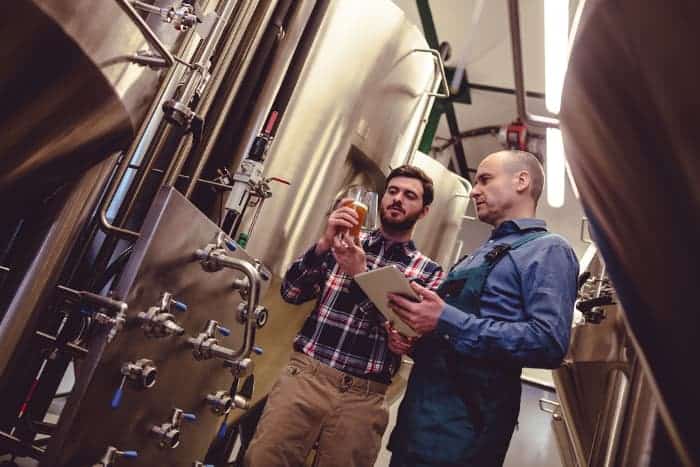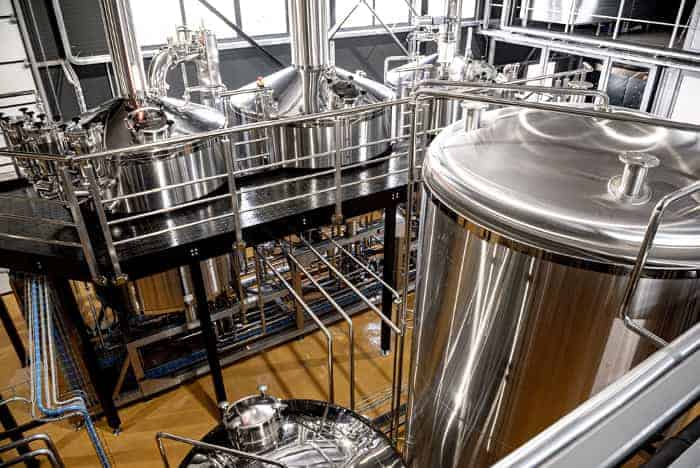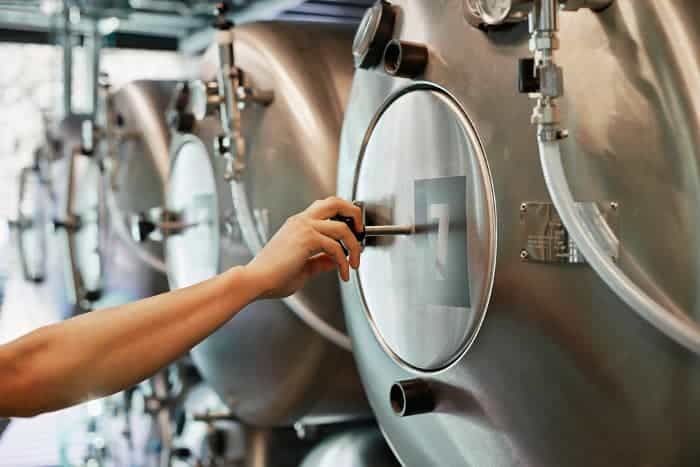You’re an experienced home-brewer with a passion for beer? A savvy business owner looking to move into a new area of business? A passionate amateur ready to jump off the deep end? You don’t know everything about the process, but you want to start a brewery? You’ve come to the right place!

In this how-to guide, we’ll take you through the ins and outs of everything about how to start a brewery. From finances and branding to equipment and staffing — you’ll know all you need to make your dream brewery a reality.
You Already Know About Beer
If you’re planning to open up a brewery you likely have one thing under your belt, you know about beer! But do you know enough? Before sitting down and crunching the numbers, leasing your space, and preparing your staff, you’ll need to know what kind of beer you’re looking to brew and have plans for sourcing the ingredients you need.
Have Brewing Experience
Your beer is the heart and soul of your brewery, so don’t leave the details to chance. If you’re looking to start a brewery it’s best to have experience working in a commercial brewery or have a partner or someone on staff who does.

Even if you’re an expert home brewer, transitioning to commercial brewing of any size is a huge task! To run a brewery you’ll need to be methodical and keep detailed records of every batch you brew to keep your beers consistent. You’ll have to be patient with the round-the-clock process of fermentation, which will keep you always on the job! And you must have clean-freak tendencies, as you’ll need to keep your facility in tip-top shape.
Ultimately, once your business is up and running you’ll need to be committed to the process! Brewing itself, for all the experimentation it can involve, is a repetitive process, that takes both patience and a streak of perfectionism.
Have Your Own Style
It’s not enough to make good beer, in the brewery business you need to have the know-how to make beer that stands out! As craft brewing gains popularity across the United States you have to be sure you know what beers taste great, what styles you’re looking to brew, and what will be a hit.
Know if you’re looking to brew sustainably with local ingredients, or in a specific style. Are you making classic brews to perfection or small-batch experiments? Make sure you’re cornering a niche in the market. And don’t forget, you’ll need to practice and taste, and keep tasting, not just to drink, but to get the flavors just right!
Know Where Your Product is Coming From
A huge part of the cost of brewing is in the ingredients, make sure you have local connections, or a plan to be supplied. Don’t find yourself caught off-guard by the cost of grains or hops. Know that for many beer drinkers ingredients with a story are important! It’s not enough to have hops, you need to know the varieties you want to work with, and how they’ll taste when brewed.

Planning
Now that you have that perfect beer, or beers, to please the crowds, it’s on to the hard part of starting your brewery– running a business. Make sure you plan ahead!
Choose a Business Model
Once you have a beer, you’ll need a business model!
Your business plan isn’t just for show, or to get money from investors, it’s a guide for you to follow to make sure your dreams make it into reality. Many of the specific parts of the business plan will be discussed after, but it provides a framework for every part of the process and so it is an essential tool to start your planning with!
Important Parts of your Business Plan include:
- Start with a high-level Summary! Explain your concept, your values, and why you’ll succeed.
- Mission Statement – Who are you? What is the goal of your business?
- Business Description -Explain what you’re selling, where you’ll be located, the size of your operation, the specifics of your beers, and the sales model you want to use.
- Market and Consumer Analysis – You need to know and be able to explain the specifics of both the larger market you’re entering and the specific consumers you plan to reach. Express the pros and cons of the area you’re building your brewery and the reason your product will appeal to your specific audience.
- Competitors – Who else is selling products like yours, to customers like yours, in your market?
- Sales and Marketing – Explain your plans to market and sell your product! Will you promote in person? At conventions? Online? To sales reps or customers directly?

Money Matters
Start-Up Costs
How much will it cost to start a brewery? That depends on a lot of different factors, from location to size. Every business is different and you’ll need to run the numbers on rent, renovation, staffing, equipment, decor, bottling, branding, license fees, and incidental costs!
Still, you can expect to spend at least $500,000 and even as much as $2 to $3 million to open up a brewery.
Remember, while you’ll need to be sure to have money for equipment and 2 years of rent at the outset, don’t just have the bare minimum of funding you think you need. There will always be unexpected costs! Your business may not begin to bring money in until after a year or two of beginning the project of opening a brewery, so don’t let yourself be halted by coming into it financially unprepared. It’s wise to have at least double the money you think you need.
Where’s the Money Coming From
Before you commit to equipment or a location, you’ll need to know where your money is coming from. You can draw from your savings, investors who believe in your brand, or US Small Business Administration loans.

Investors
If you’re looking to pull in investors it is important to have your business plan pitching ready as many will need to know the ins and outs of every aspect before they’re willing to put in funds. There are many different types of investors, with different levels of practical involvement! Whether your investors are just providing funds, or will form part of an ownership committee or act as direct co-owners, they will greatly impact the running of your brewery.
Small Business Loans
There are three types of Small Business Loans well suited to opening a brewery, SBA 7(a) Loans, SBA 504/CDC Loans, and SBA Microloans, all of these loans can be found through private banks and because they are government loans often have competitive rates. There are also private loan options available from many different banks and private lenders, though they often have higher interest rates and are a riskier investment.
Do You Need a Financial Expert?
It’s great if you, or one of your partners, is an experienced business owner or plans to focus solely on finances! But if you don’t have the experience, consider hiring a dedicated financial person to budget, monitor cash flow, and make sure there are no surprises. Every individual aspect of your brewery is a full-time job, so don’t let yourself get stretched too thin when it comes to money matters when any mistakes could lead to real catastrophe.
Still most business owners would agree that it’s better to be the expert yourself, and if you can’t be to be sure you’re always in the know! Any small business owner needs to be aware of every aspect of the financial health of their business. You should know all of the specifics of the health of your business at all times. Things like profit margin, labor costs, and tax law could all make or break your business. Try not to let yourself be taken over by creative passion for your product to the point where you lose sight of financial groundwork your project rest on.
Brand Your Brewery
Success may be in the brewing and planning, but don’t leave your marketing to chance! You’ll need to understand your company values and the key emotions you want to evoke in your audience. Are you a classic brewery, or edgy and innovative? Are you into sustainability, local hops, or established in a specific regional or ethnic brewing niche?
As craft breweries open up all over the United States it’s just as important to distinguish yourself from the competition with a compelling concept for your brewery as it is to brew great beer!
Choose a Name
A great name will take you far, and is the first impression many will have of your brewery! Some things to keep in mind when naming your brewery:
- Be sure to always have your bigger brand and goals in mind while you brainstorm names.
- Research all of the possible connotations a word or phrase might have so you don’t accidentally create an impression that isn’t exactly right.
- Be true to your brewing style, and the look of your taproom! Let people know what they’re getting when they hear your name.
- Be true to your values and brand identity!
- Workshop a few options, don’t just pick the first name that comes to mind!
Choose a Logo
Your logo is as important as your name when it comes to creating brand recognition. You should be sure to carefully design your packaging, signs, and menus in a single coherent vision that relates to your name. The center of all of these design elements is your Logo!

By picking a bold, memorable logo that reflects your name and your brand people will remember your beers or be drawn to pick them out of the cooler at a store.
Remember, people do judge books by their covers!
Create Your Packaging
Bold, unique, branded! There are a lot of different ways to label and package your beers. Consistency and brand recognition are key. You can hire artists, or keep it simple, but the most important thing is to have labeling that draws eyes and keeps the customer coming back for more.
Location, Location, Location
Lease a Space
Choosing a location can be one of the biggest hurdles in starting a brewery! Location is king, but with a great location comes high rent, and often a lot of competition. Scope out the neighborhoods you’re thinking of renting in, do you want a space that is close to home in a specific place, or are you looking for somewhere with room to grow?

When planning out a lease consider the kind you’re getting into. Commercial lease agreements most often come in one of two varieties “triple net” and “gross.” In a gross lease, the landlord pays expenses associated with ownership (think utilities, insurance, taxes) and the tenant pays a fixed fee, in a triple net lease the tenant pays the landlord rent as well as part of the taxes, insurance, and maintenance of the building. Typically this amounts to rent + an additional payment that is 1/12 of these expenses- these are then adjusted at year-end based on actual costs.
Remember to pay attention to any licenses needed for the specific location you’re looking to open your business in as different areas have different costs associated with opening an alcohol-based business.
Buy Your Equipment
If you’re going to start a manufacturing operation you’ll need to own and install all of the necessary equipment in your space. Brewing requires a lot of equipment, much of which is a challenge to move around or upgrade once installed.
At minimum to open a brewing operation you’ll need:
- Kettles
- Kegs
- Boilers
- Bottling and Canning Lines
- Conveyors
- Cooling Systems
- Storage Tanks
- Filters
- Beer Labeling Machines
- Piping and Tubing
- Refrigeration Equipment
- Cleaning Equipment
- Waste Treatment Systems
- Tap Handles

How much this equipment will run you will depend on the size of the equipment and whether you buy new or can find used equipment at a good price. While starting small to save money can seem like the smart approach, it is worth considering the difficulty of upgrading your entire system if you are a success and max out your capacity. Renovating a space and installing brewing equipment is expensive, so make sure you have future plans in mind before you commit your finances to this part of the project.
Prices to fit out and install equipment for a brewery can run between $100,000 for used equipment with a small capacity (the smallest barrels hold around 31 gallons of beer), or over $1 million for brand new equipment for up to 30-barrels of beer. Brewing equipment can be found from wholesalers, specialty supply stores, at auction, or from private owners looking to resell.
Legal Stuff
Before you’re ready to open you’ll need to make sure you’ve crossed your Ts and dotted the Is on all the legalities. No small part of running a business, and keeping it open, is making sure you are in the know about the laws around businesses, selling beer as a manufacturer or in a taproom, and the production of alcohol.
Form an Entity
Having a business entity is a necessary protection for your assets! If your brewery goes under, you won’t need to worry about having to go personally bankrupt. It also makes sure operations with multiple owners buying in have written agreements about who owns what, what to do if an owner leaves, or if someone wants to buy in.
Businesses tend to be either LLCs (Limited Liability Companies) or S (Subchapter) corporations. LLCs are an option best for a single owner, while the required Board of Directors makes an S Corporation a great choice for a business being opened by a group.
These entities can be formed by an attorney for a fee.
Licenses
A Federal Brewing License is key, The Alcohol and Tobacco Tax and Trade Bureau (TTB) within the US Department of the Treasury regulates the beer industry and you will need a federal permit to legally operate a brewery.
But, a Federal Permit isn’t all you’ll need! Depending on your state, county, or city you may need other permits or licenses, including liquor licenses, wholesale licenses, guild memberships and/or manufacturers licenses to operate your brewery and open a taproom, and/or sell your beers to retailers.
Once you know what licenses you need, you’ll need to be sure to have the paperwork done on time, and leave yourself the wiggle room in both your timeline and your budget for bureaucratic delays.
It’s Time to Open
Hire and Train Your Staff
Hiring good staff, and retaining great staff, is key to any businesses success. As most states are “at will” employment states you need to have solid contracts and make sure you have plans in place so that no one employee is indispensable. From brewers, to front of house staff, you’ll need to make sure you have back up before your business gets busy, so you aren’t in a bind when you need support the most.

Should You Have a Tasting/Tap Room?
Some breweries manufacturer for distribution only, but for small scale operations having a taproom, tasting room, bar and/or restaurant can make or break the operation. From drawing in an audience, to allowing to to speak directly with your customers, to letting you establish a brand before having to convince other business owners to buy in. These storefronts to your operation are the heart and soul of your connection with the community!
Getting your Beer in Stores
You can either self-distribute or hire a distributor to get your product in stores, both locally and farther afield.
Self distributing is a great way to start! When you self distribute you have direct access to feedback from consumers, you improve your margins by cutting out a middleman and have absolute control of the process with no fears about your product ending up at a business you don’t support.
Unfortunately self-distribution has it’s own costs! From sales people to forklifts you’ll need to manage things yourself, or pay someone to take over. And unfortunately it remains illegal to self-distribute alcohol in the following states:
- Alabama
- Delaware
- Florida
- Georgia
- Kansas
- Kentucky
- Louisiana
- Mississippi
- Missouri
- Nebraska
- Nevada
- Rhode Island
- South Carolina
- Vermont
The advantage of a distributor is they know what they’re doing! They’re the expert in selling products and they have the resources and connections to get your products in stores. While you might lose out on being just one client among many, you may gain support from an established supply chain.
Host an Opening!
We’ve saved the best for last! Now that you’ve done all the hard work and you have beer in hand, and on tap, it’s essential that you host an opening and invite the community into your space.

You can keep up the momentum by building brand awareness in you community by attending events, having a booth at the local farmers market, and making your presence known by sponsoring local teams. The more you put into communicating with your audience, the more you’ll help your business flourish.
Now You Know How to Start a Brewery
Of course, the hardest part is still to come, actually starting a brewery! With time, patience, and skill, you’ll be able to put together all the pieces and craft great beers, with a great brand, in a great location!
